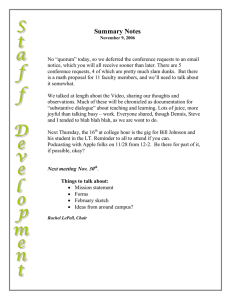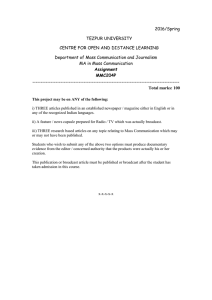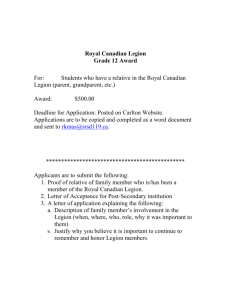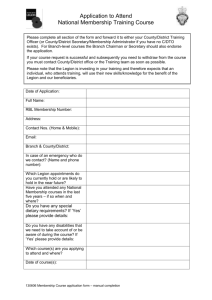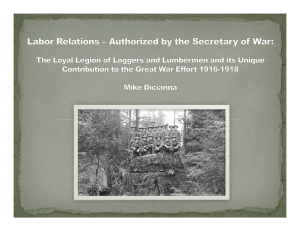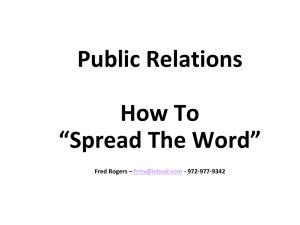RTNDA COMMUNICATOR- Overcome the BLAH, BLAH, BLAH
advertisement
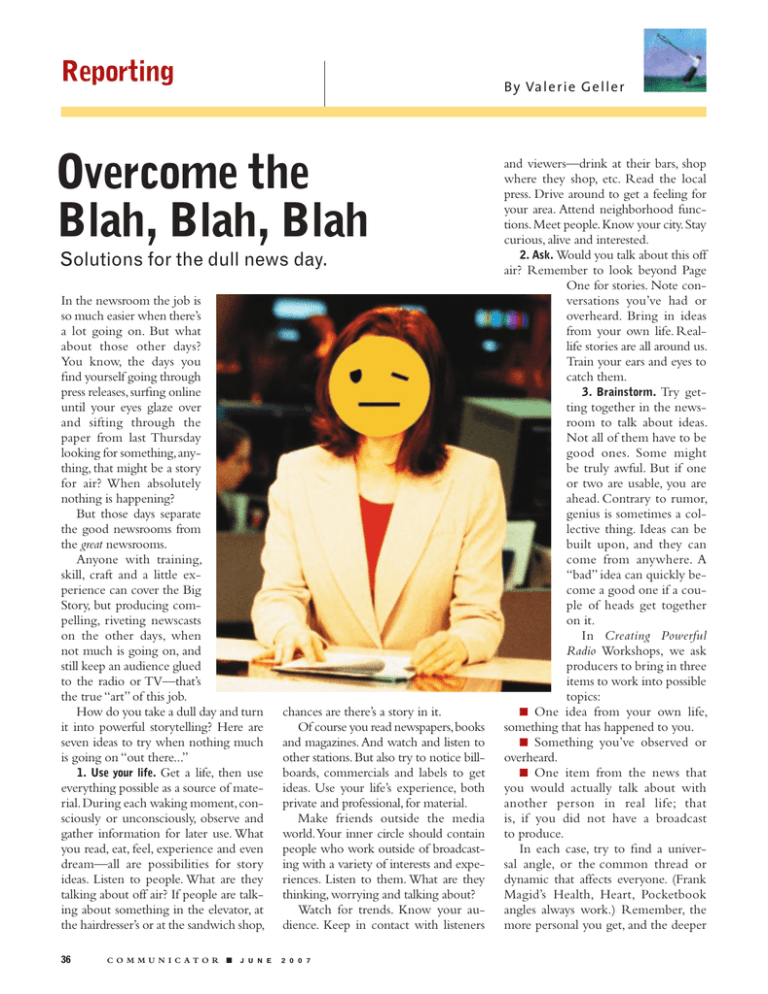
Reporting B y Va l e r i e G e l l e r Overcome the Blah, Blah, Blah Solutions for the dull news day. In the newsroom the job is so much easier when there’s a lot going on. But what about those other days? You know, the days you find yourself going through press releases, surfing online until your eyes glaze over and sifting through the paper from last Thursday looking for something, anything, that might be a story for air? When absolutely nothing is happening? But those days separate the good newsrooms from the great newsrooms. Anyone with training, skill, craft and a little experience can cover the Big Story, but producing compelling, riveting newscasts on the other days, when not much is going on, and still keep an audience glued to the radio or TV––that’s the true “art” of this job. How do you take a dull day and turn it into powerful storytelling? Here are seven ideas to try when nothing much is going on “out there...” 1. Use your life. Get a life, then use everything possible as a source of material. During each waking moment, consciously or unconsciously, observe and gather information for later use. What you read, eat, feel, experience and even dream—all are possibilities for story ideas. Listen to people. What are they talking about off air? If people are talking about something in the elevator, at the hairdresser’s or at the sandwich shop, chances are there’s a story in it. Of course you read newspapers, books and magazines. And watch and listen to other stations. But also try to notice billboards, commercials and labels to get ideas. Use your life’s experience, both private and professional, for material. Make friends outside the media world. Your inner circle should contain people who work outside of broadcasting with a variety of interests and experiences. Listen to them. What are they thinking, worrying and talking about? Watch for trends. Know your audience. Keep in contact with listeners 36 2 0 0 7 Communi cator n J U N E and viewers—drink at their bars, shop where they shop, etc. Read the local press. Drive around to get a feeling for your area. Attend neighborhood functions. Meet people. Know your city. Stay curious, alive and interested. 2. Ask. Would you talk about this off air? Remember to look beyond Page One for stories. Note conversations you’ve had or overheard. Bring in ideas from your own life. Reallife stories are all around us. Train your ears and eyes to catch them. 3. Brainstorm. Try getting together in the newsroom to talk about ideas. Not all of them have to be good ones. Some might be truly awful. But if one or two are usable, you are ahead. Contrary to rumor, genius is sometimes a collective thing. Ideas can be built upon, and they can come from anywhere. A “bad” idea can quickly become a good one if a couple of heads get together on it. In Creating Powerful Radio Workshops, we ask producers to bring in three items to work into possible topics: n One idea from your own life, something that has happened to you. n Something you’ve observed or overheard. n One item from the news that you would actually talk about with another person in real life; that is, if you did not have a broadcast to produce. In each case, try to find a universal angle, or the common thread or dynamic that affects everyone. (Frank Magid’s Health, Heart, Pocketbook angles always work.) Remember, the more personal you get, and the deeper Reporting you go, the more likely you are to strike a universal chord. Once, when I was running a news department, one of our reporters went through a bad night, waiting for her boyfriend to come home. She was a mess at work the next morning. I suggested she make a story out of her jealousy and put it on the air. She came up with an award-winning feature series called “Can a Man Be Satisfied with Just One Woman?” 4. Use your sources to get stories. Interesting, accomplished people tend to hang around other interesting and accomplished people. The next time you interview a fascinating person, on any topic, try asking if he or she knows anyone else they think might have a good story to tell.You may be very surprised and delighted at the people and the sto- ries you find this way. Ask a friend who has a friend. Always get a phone number. Keep your database updated. Hang on to phone numbers of all sources. Today’s guests may be tomorrow’s sources. Ask them to call you when things are happening. 5. Archive obsessively, make and keep follow-up files. “One year ago today the rapist was released from prison.” Where is he now? Did he go back to the old neighborhood? Keep meticulous follow-up files and check them. Often revisiting or updating a story from the past leads to interesting and compelling journalism for today. 6. Pre-record “evergreen” stories for days like this. Like keeping frozen din- ners on hand for an emergency, save evergreen stories in the “Tupperware” for later. 7. Be prepared. When was the last time you thought to yourself, “I wish I was recording this right now?” Try keeping a recorder, note pad or camera phone nearby at all times. Story ideas come in the shower, the car, the middle of the night. And when they come, write them down!—Valerie Geller is a former news and programming director who now serves as a news/talk broadcast consultant and author. She has worked with more than 500 stations in 27 countries, including the BBC. Visit www.creatingpowerfulradio. com or www.gellermedia.com. Editor’s note: This column was excerpted with permission from Creating Powerful Radio: Getting, Keeping & Growing Audiences and News, Talk, Information & Personality. Advertisers WTVF-TV News Channel 5 Nashville, Tennessee is the winner of 2007 Fourth Estate Award for outstanding achievement in the Field of Journalism Visit The American Legion at http://www.legion.org Many thanks to the companies and organizations that advertise in Communicator. PAGE PHONE 615 Music Advertiser www.615music.com URL 5 888.615.8729 AAAS www.aaas.org/sjawards 29 202.326.6400 American Legion www.legion.org 37 317.630.1253 Associated Press Broadcast www.apbroadcast.com C3 202.736.1152 Broadcast Design International Inc. www.broadcastdesign.com 23 760.729.9229 Devlin Design Group www.ddgtv.com 13 970.453.9360 duPont/Columbia Awards www.dupont.org 30 212.854.5047 The Express Group www.theexpressgroup.com 35 619.298.2834 Focus on the Family www.family.org 33 719.531.3371 FX Group www.fxgroup.tv 32 407.877.9600 JVC Professional www.jvc.com/pro 25 800.582.5825 Knight Center www.kfellows.org 19 734.998.7666 Kovsky Miller Research www.kovskymiller.com 7 513.981.0921 MyWeather LLC www.routecast.com C2 608.441.0400 NSI www.specifynsi.com 31 800.773.2624 OnCall Communications www.occsat.com 21 949.716.3030 RF Central www.rfcentral.com 4 717.249.4900 RTNDF www.rtndf.org 7 800.80RTNDA Stephen Arnold Music www.stephenarnoldmusic.com C4 214.726.1010 VDO www.vdo.tv 7,9,11 727.631.0709 Call Rick Osmanski at 202.467.5200 to find out why your company should be on this list. J U N E 2 0 0 7 n C o m m u n icato r 37
